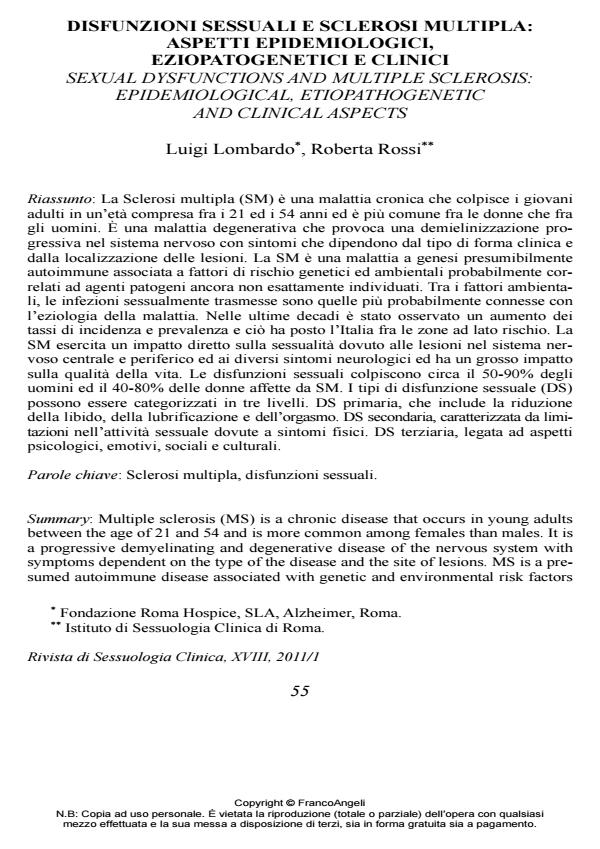Sexual dysfunctions and Multiple sclerosis: epidemiological, etiopathogenetic and clinical aspects
Journal title RIVISTA DI SESSUOLOGIA CLINICA
Author/s Luigi Lombardo, Roberta Rossi
Publishing Year 2011 Issue 2011/1
Language Italian Pages 20 P. 55-74 File size 145 KB
DOI 10.3280/RSC2011-001004
DOI is like a bar code for intellectual property: to have more infomation
click here
Below, you can see the article first page
If you want to buy this article in PDF format, you can do it, following the instructions to buy download credits

FrancoAngeli is member of Publishers International Linking Association, Inc (PILA), a not-for-profit association which run the CrossRef service enabling links to and from online scholarly content.
Multiple sclerosis (MS) is a chronic disease that occurs in young adults between the age of 21 and 54 and is more common among females than males. It is a progressive demyelinating and degenerative disease of the nervous system with symptoms dependent on the type of the disease and the site of lesions. MS is a presumed autoimmune disease associated with genetic and environmental risk factors possibly related to still unidentified pathogens. Among environmental factors, sexually transmitted infections are most likely connected with the etiology of MS. The increase in both incidence and prevalence rates has been observed in last decades and has put Italy in a high risk zone. MS exerts a direct impact on sexuality due to lesions in the central and peripheral nervous system and to different neurological symptoms and has a great impact on quality of life. Sexual dysfunctions affect about 50-90% of men and 40-80% of women with MS. The types of sexual dysfunction (SD) can be categorized in three levels. Primary SD includes impaired libido, lubrification and orgasm. Secondary SD is composed of limiting sexual expressions due to physical manifestations. Tertiary SD results from psychological, emotional, social and cultural aspects.
Keywords: Multiple sclerosis, sexual dysfunctions
- Depressione e benessere psicologico in persone con sclerosi multipla: il ruolo dell'identità, del senso di coerenza e dell'autoefficacia Emanuela Calandri, Federica Graziano, Martina Borghi, Silvia Bonino, in PSICOLOGIA DELLA SALUTE 1/2016 pp.49
DOI: 10.3280/PDS2016-001007 - Curare l'uomo, non il sintomo: la promozione della salute sessuale nella sclerosi multipla secondo l'approccio integrato Eloisa Dasara, Elisabetta Todaro, in RIVISTA DI SESSUOLOGIA CLINICA 2/2020 pp.23
DOI: 10.3280/RSC2020-002002
Luigi Lombardo, Roberta Rossi, Disfunzioni sessuali e Sclerosi multipla: aspetti epidemiologici, eziopatogenetici e clinici in "RIVISTA DI SESSUOLOGIA CLINICA" 1/2011, pp 55-74, DOI: 10.3280/RSC2011-001004